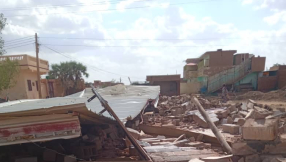Zimbabwe Faces Bread Shortages in Food Crisis
The closure followed the government's recent admission that it could not afford to pay for wheat from Mozambique.
President Robert Mugabe's government, presiding over an economic crisis with runaway inflation and chronic shortages of food and fuel, had planned to buy 36,000 tonnes of wheat from its neighbour to ease the bread crunch.
Lobels Bread, the country's major bread producer, has only two days' supply of wheat and has had to cut daily production to 40,000 loaves from 200,000 loaves in May, Lemmy Chikomo, the firm's operations director, told state media.
Chikomo said Lobels had shut its bakery in Bulawayo, Zimbabwe's second largest city, on Aug. 25 and had sent home hundreds of workers at its main factory in the capital Harare.
"Flour availability has deteriorated, and this has forced us to use our strategic stocks since May. Now we are only left with two days' supply," he said.
SHORT OF FUNDS
Officials from the state-owned Grain Marketing Board (GMB), which is responsible for managing national wheat and maize stocks, were not immediately available for comment.
The World Food Programme's Zimbabwe representative, Kevin Farrell, said the U.N. agency was seeking an additional $100 million to deliver grain to southern districts, which are suffering most from the shortages.
Farrell said a visit he made to the region showed the situation was getting "acutely serious".
"We aim to have, for distribution, just about 300,000 metric tonnes and we have about 60 percent of that, including pledges and donations," he told reporters after receiving a $3.5 million donation from the Canadian embassy in Harare.
Critics accuse Mugabe, in power since independence from Britain in 1980, of mismanaging the economy and destroying the agricultural sector through his government's seizure of white-owned commercial farms.
The seizures, which began in 2000, saw some of the country's most fertile land handed over to blacks without farming skills and led to a sharp drop in agricultural output in a country that once exported food to other parts of Africa.
Mugabe accuses Western countries of sabotaging Zimbabwe's economy in retaliation for the seizures and working with the opposition to oust him.
The economic crisis has worsened in the past three months as the government imposed a price freeze on many consumer items to try to control inflation, currently above 7,600 percent.
The policy has backfired. Many stores shut their doors, rather than selling at a loss.
Chikomo said Lobels Bread has been unprofitable since May and had accrued huge debts to keep paying its workers.













